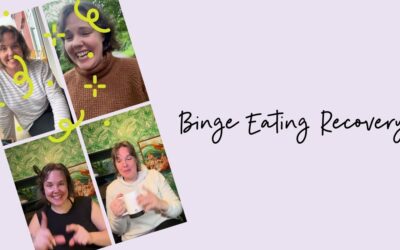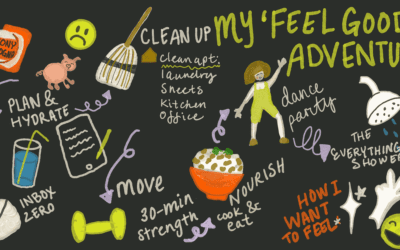I used to worship at the altar of efficiency. My freezer was a shrine to Trader Joe’s frozen meals—saag paneer for $4 and four minutes in the microwave, problem solved. Hunger was an inconvenience to be managed, not an experience to be savored. I optimized my way through meals the same way I optimized everything else: fastest path from need to satisfaction.
In many ways, I’m grateful those fast options existed. I had no energy, had been overweight for years, and experienced depressive episodes that further flattened me. When you’re barely keeping your head above water, a four-minute meal feels like a lifeline, not a cop-out.
Society had sold me this story perfectly: as a working mom, my life was inherently stressful, and I needed something quick and easy. The endless parade of “life hacks” and “time-saving solutions” reinforced this narrative—that I was too busy, too overwhelmed, too stretched thin to do things the “hard way.” The convenience industry thrives on this mythology of maternal burnout, offering us shortcuts instead of the support we actually need.
But here’s what I’ve learned: mothers don’t need more convenience. We need societal support to take care of us. We need community, rest, and resources. We need the kind of care that allows us to engage fully with life rather than just survive it. Because giving to mothers is the only trickle-down economics I see working—when mothers are supported, families flourish, communities strengthen, and entire societies benefit.
Somewhere along the way, I began to notice what I was losing in all that gaining of time.
From Problem to Invitation
The shift started with making my own whole-wheat sourdough, which has become a daily commitment to keep the starter active. I regularly pick recipes to make in bulk that are made from scratch and use seasonal ingredients. We’re becoming less of a snack kitchen, and more of an ingredient kitchen.
Instead of reaching for that familiar orange package, I began sourcing ingredients from local farmers. I started a hydroponic garden in my kitchen, watching seeds transform into food with my own hands. What seemed like an inconvenience at first—the time, the mess, the uncertainty—became something else entirely.
I discovered that my hunger wasn’t actually a problem that needed solving. It was an invitation to explore life.
Through this slower approach to nourishment, I went nettles foraging with my sister-in-law, bought cookbooks with recipes that are made with whole ingredients, but have stories and memories and depth of meaning behind them. My relationship with food became a web of connections—to the land, to the seasons, to the people who grow what sustains us.
The convenience I thought I needed was actually cutting me off from these deeper moments of life.
The Convenience Trap Beyond Food
This realization has me questioning convenience everywhere. I often write with AI as a companion, to organize my ideas and correct my spelling. Even as I do this, I’m aware that working with AI feels like choosing the convenient option—outsourcing the struggle and uncertainty that often leads to breakthrough insights. What am I missing when I optimize away the messy, inefficient process of wrestling with ideas myself?
Consider how convenience has reshaped our relationship with:
Learning: Why spend hours in a library when information is instantly searchable? But what about the serendipitous discoveries that happen when you’re lost among physical books, or the deeper understanding that comes from sitting with difficulty instead of immediately seeking answers?
Community: Why knock on a neighbor’s door when you can order everything online? But what about the informal networks of mutual aid that form when we actually need each other for daily life? There are lending libraries in many local public libraries with items like printers, sewing machines and more—I need to check this out.
Creativity: Why struggle with a blank page when AI can generate ideas instantly? But what about the unique insights that emerge only through our own particular way of seeing the world?
Skill-building: Why learn to repair things when replacement is often cheaper and faster? But what about the satisfaction of understanding how things work, the confidence that comes from capable hands?
What We Trade Away
Every convenience is a trade-off. We gain time and efficiency, but we often lose:
- Embodied knowledge: The kind of understanding that comes through our senses and hands
- Resilience: The ability to adapt when systems fail or aren’t available
- Connection: To our environment, our community, and the processes that sustain us
- Agency: The confidence that comes from being capable rather than dependent
- Meaning: The sense of purpose that emerges from engaging with life’s challenges
The Inconvenient Path Forward
I’m not advocating for a wholesale rejection of modern conveniences—that would be both impractical and privileged. Rather, I’m suggesting we become more intentional about when we choose convenience and when we choose connection.
The theme of 2025 has been “business not as usual” in so many ways—the changes and uncertainty with the world, the content we consume, the systems we once trusted. Maybe this is the perfect time to question everything, including our relationship with convenience. What if, instead of optimizing our way through life, we got curious about what happens when we choose the messier, more connected path?
With rising food costs, now might be the best time to learn to cook from scratch, to become adaptable when shortages of items occur, like eggs. A family friend provided us with duck eggs when chicken eggs were scarce. Every time I cook a meal from dried beans, I joke to my husband, “These humble beans will get us through 2025.” There’s something both grounding and empowering about knowing you can make something nourishing from simple ingredients.
Sometimes the longer path is the richer path. Sometimes the inconvenient choice is the one that leads to the life we actually want to live. And honestly? Sometimes it’s way more fun.
Think about it: there’s something deeply satisfying about kneading bread with your hands, about teaching your kids to cook your grandmother’s recipe, about growing something edible on your windowsill. There’s joy in the process, not just the outcome. There’s laughter in the kitchen disasters, connection in the shared struggles, and pride in the hard-won skills.
The next time you face a choice between convenient and connected, pause. Ask yourself: What am I optimizing for? What might I be missing? What kind of person do I become when I consistently choose the easy path versus the meaningful one? And here’s the fun part—what if this choice could actually bring more joy, not less?
My hunger taught me that our needs—for food, for knowledge, for community, for creative expression—aren’t problems to be solved as efficiently as possible. They’re invitations to engage more fully with the world around us.
I’m here to be a voice advocating for less convenience and more life. For radical ideas on how we can strengthen our bonds with chosen family, live life fully, and learn new things to adapt to this changing world. Because if we’re going to navigate uncertainty, we might as well do it together—and we might as well make it fun.
The question isn’t whether we should choose convenience or inconvenience. The question is: What kind of life do we want to live, and what are we willing to trade to get it?
I’m still in the process of transitioning. I’ve lost 10 pounds, and I plan on losing 40 more by getting really good at being inconvenienced. This isn’t about perfection or dramatic transformation—it’s about slowly choosing connection over efficiency, one meal at a time.




0 Comments